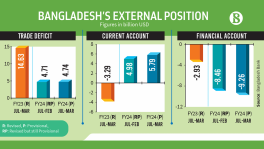Lockdown: The more laws, the more flaws
Nothing can be imposed on the public using force unless they are motivated enough to abide by those rules. And, they are not likely to abide by government directives when they see lots of discrimination, which leads to a feeling of injustice

In the afternoon of Wednesday (April 14) - the first day of the Bengali New Year which was marked by the Ramadan and all-out lockdown simultaneously, rickshaw-puller Anis Sheikh and Obaidul Sheikh were sitting sadly on the pavement in front of Kushtia Model Police Station.
The duo is among 35 rickshaw pullers whose rickshaws were seized by police in the morning for violating lockdown directives issued by the government. The rickshaw pullers were roaming around the police station hoping to get their rickshaws back, which did not happen until 11 pm on Thursday. Moreover, the officer-in-charge concerned could not say when the rickshaws would be returned to the owners.
"When the rickshaws were seized, many four-wheelers passed in front of us but police did not stop them. Our only fault is we are poor," said Obaidul Sheikh in a frustrated and depressed voice, losing the only way to earn a living.
In response to the news, someone commented on Facebook, "The laws in Bangladesh is a spider web. The poor get stuck here and the rich get out of the web."
If the government applied the same level of strictness throughout the country, it would have been lauded. Unfortunately, there is huge discrimination regarding the implementation and enforcement of the lockdown directives, which has led to a lack of trust and credibility among people.
For example, makeshift iftar shops on pavements are closed and the people associated with this have become completely out of income during the time of Ramadan. Customers of these pavement shops are also in problem as they cannot buy iftar at an affordable rate.
On the contrary, there was a crowd of cars and people in front of many big restaurants in the capital's elite areas, violating lockdown directives and even ignoring the general social distancing rules.
Again, almost all offices are open but public transports are closed. How would people go to their offices? Even if private transport is available, is it possible for all to bear the cost of using private transport every day?
There is no specific arrangement by the government for transport in case of emergency cases such as medical services. In the media, we have watched patients and their relatives waiting for transport.
On Monday, a rickshaw puller in Rangpur pulled his rickshaw for nine hours to take his severely sick infant to Rangpur Medical College Hospital as there was no public transport. Moreover, he was too poor to rent a car.

People have told the media that they came to Dhaka on rent-a-car from Sylhet, Comilla, and other nearby districts for emergency needs, paying three times the usual fare.
The government could have mentioned emergency needs more specifically and arranged transports, which could have created many jobs for transport people ahead of Eid.
Although public transport was banned there were some government office buses carrying passengers in the capital and of course paying heed to health hygiene and social distancing rules.
Moreover, as huge crowds of people were leaving Dhaka for their village homes, many private vehicles took advantage of the absence of inter-district bus services. There were posts on Facebook seeking travel partners for a car or a microbus to a certain district from Dhaka.
Isn't it the failure of the administration to control private transports and the movement of people?
The government should have consulted with public health experts and to work according to their suggestions and recommendations. However, we have seen Dr. Abul Bashar Mohammad Khurshid Alam, the Director General of the Directorate General of Health Services have recently criticised public health experts severely for discerning misleading information regarding Covid-19 and misleading people. He has also found fault with media personnel.
However, he has not mentioned specifically which information provided by health experts or which role played by the media was misleading and why. Instead of presenting counter-arguments, this type of attitude of grossly blaming media and health experts is not acceptable at all and it will not help address and solve the challenges that prevail during a pandemic situation.
Instead, the government could have worked on the weakness prevailing in the health sector in the last year to better handle the pandemic. A report published in The Business Standard on 16 April reads that the number of Covid-19 testing labs has increased in one year but a shortage of lab technicians is behind the still low number of tests done in Bangladesh.
According to experts, the spread of infection cannot be stopped unless tests are significantly increased. However, due to a lack of lab personnel at testing facilities, people's sufferings in submitting samples for the Covid-19 test and receiving test results persist.
So, what has the government learnt in one year of the pandemic? What has it done to overcome the shortcomings of our health system and what prior measures it has taken to counter probable adverse situations?

Several reports in the media have pointed out a mismatch between the data provided by the Institute of Epidemiology Disease Control and Research (IEDCR) and that of various hospitals. On several occasions, patients admitted to hospitals were not included in the IEDCR data.
Why cannot the government make a database with NIDs so that more accurate information can be obtained regarding infections, deaths, recoveries, beds in hospitals, ICUs, etc? We all know that the more accurate the data is, the better the decision is.
In handling the businessmen, discrimination is evident when the government has bowed to pressure from various sectors and allowed them to continue their operations.
It failed to be strong enough to turn down proposals made by ready-made garment owners, shop owners, and transport owners for running their business and factories. Are there any scientific findings that those businesses are immune to Covid-19 infection?
Moreover, the government has allowed many events which were not urgent and could have been postponed such as municipality election, BGMEA election, Ekushey Book Fair, medical college admission tests, etc which have caused the infection rate to increase.
Without addressing these issues, a "strict" lockdown is not strict enough or not even a lockdown at all. Rather it has proven that "the more laws, the more flaws".
On the other hand, if people are allowed to go out with a Movement Pass, how is it possible to make the lockdown successful? The government should have mentioned very specifically for which purposes people can go out and awarded strict punishment for the violators.
Nothing can be imposed on the public using force unless they are motivated enough to abide by those rules. And, they are not likely to abide by government directives when they see lots of discrimination which leads to a feeling of injustice.
In a densely populated country like Bangladesh, where most of the people work in informal sectors, it is not possible to make a lockdown successful by stopping people's income, especially those who live from hand to mouth.
So, there is no alternative to Covid-19 allowance for people whose income has stopped. From the experience of last year, the government should have prepared a fund beforehand to deal with the pandemic.
A database using NID could have been made in cooperation with the grassroots-level public representatives. At the same time, it must ensure proper distribution of the fund so that the truly needy and poor get the assistance.
Disclaimer: The views and opinions expressed in this article are those of the authors and do not necessarily reflect the opinions and views of The Business Standard.


 Keep updated, follow The Business Standard's Google news channel
Keep updated, follow The Business Standard's Google news channel
















